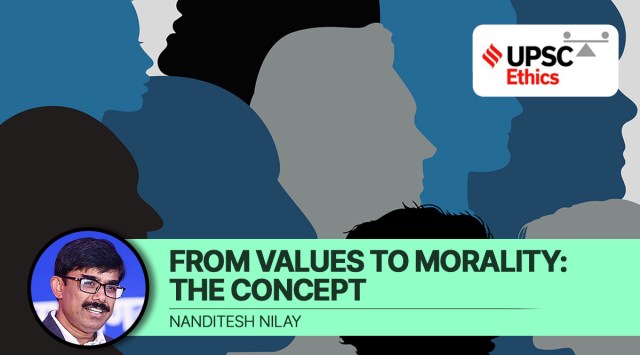UPSC Ethics Simplified | From Values to Morality — the concept
Understanding morality is a prerequisite to ethics. Let's know more for UPSC CSE Ethics paper from Nanditesh Nilay.
 "Without understanding moral standards, we can not define ethics," says Nanditesh Nilay. (Image Credits: Abhishek Mitra)
"Without understanding moral standards, we can not define ethics," says Nanditesh Nilay. (Image Credits: Abhishek Mitra) (The UPSC Essentials Indian Express is now on Telegram. Click here to join our channel and stay updated with the latest updates.
Subscribe to The Indian Express UPSC Key and prepare for the Civil Services and other competitive examinations with cues on how to read and understand content from the most authoritative news source in India.
Note: Catch the UPSC Weekly Quiz every Saturday evening and brush up on your current affairs knowledge.)
Earlier we understood the concept of Values or those fundamental human feelings, beliefs, and notions which are considered conducive as well as urgent to human happiness and harmonious living in society.
Now before exploring the concept of Ethics, it will be appropriate to answer the universal aspects of human values and morality.
Relevance: The topic is a part of UPSC CSE General Studies Paper-IV Ethics Syllabus. Aspirants will find the article useful for their Essay paper too. Moreover, the essence of the article will help aspirants in their professional lives or in life in general.
Nanditesh Nilay writes for UPSC Ethics Simplified fortnightly on Sundays. The first article is a concept while the second article is a caselet based on the concept.
The ‘unchanging’ fundamental values
There is no denying of the fact that when we go through various literatures, we come to a conclude that several fundamental human values are universal as well as eternal. These are intrinsic to all of us, all human beings, and definitely, they are manifestations of the natural order. That natural order which exists permanently and which is often referred to as the ‘law’ or ‘Dhamma’ etc.
The carrying out or pursuance of these universal values forms the basics of ethical human conduct. Examples of such universal human values are love, non-violence, compassion, truth, etc.
However, it is also noticed that some values appear to be changing with place, time, and community. However, a deeper understanding will kindle us to understand that these are only the derivatives of these fundamental human values, expressed in the specific context of time and place, etc. Therefore, a few values appear around changing texture. Nevertheless, fundamental human values never change. If we enter into the tunnel of self-doubt or any kind of dilemma about the authenticity or appropriateness of any value, one will have to take reference from the foundational universal human values only. There is no other way out. And the more one’s conduct is around universal human values, the better will be the health of individualistic and collective happiness. People will choose nature, harmony, tolerance, nonviolence, and peace over any kind of indifference.
Morality and moral standards
Now around this background and context, one can find the reasoning for understanding Ethics rather than jumping straight into this concept. So what is Ethics? It is that discipline which is involved in examining the moral standards of an individual or society at large. So it is clear that without understanding moral standards, we can not define ethics.
Before moral standards, let’s understand morality. Morality is all about those standards that a group or a person has about what is good and evil or what is right and wrong. Moral standards are those norms or types of conduct or actions that are believed to be right and wrong. Later they are those values that are placed on what we believe to define what to be morally right or wrong, good or evil/bad.
Moral norms
These are general rules such as, “One should never bribe.” And moral values are expressed through the value or worth of those moral norms. Here it can be expressed as a statement, “Honesty is wisdom”.
So the key feature of morality or moral standards is the kind of subject it deals with. Those matters which bring serious benefit to mankind or save human society from any kind of wrong doings.
This whole discussion is leading us to the central theme of the paper which is Ethics and its importance in general and particularly in governance. Further, this discussion can lead to a secondary question of the importance of ethical attitude in governance. Let’s know more in our future articles.
EXPRESS INPUT
A note on Public Morality
In her opinion piece (Public morality and the Aryan Khan case) for The Indian Express, R Mahalakshmi wrote:
What is public morality? Even though there is no written document that provides a blueprint for what goes under that head, there is a general understanding that individuals are expected to behave in certain ways that are considered acceptable, and that some of these actions are governable by law. In other words, individuals, notwithstanding their private choices and actions, could face legal repercussions for actions that fly in the face of public morality. That then leads us to the questions: How do we come to an agreement about what is acceptable? Is public morality a static concept, something that is a given and immutable?
Those who had gone through their youth and early adulthood in pre-liberalisation India would remember that it was considered improper for middle-class girls and boys to be speaking to each other outside the familial circle, even for innocuous things. If at all it was allowed, there was supposed to be strict supervision so that the youngsters would not cross any “lakshman rekhas”. In the 21st century, it would be ridiculous to tell young women and men in India or elsewhere that they cannot talk to their classmates of the opposite sex, or their neighbours, or the children of family friends.
In cinema, “vamps” such as Jaya Malini, Silk Smitha, and Helen, who had a provocative physical presence, were definitely not meant to be role models. For that, you had docile heroines, who danced, sang and devoted themselves to just one man. Today, neither in terms of attire, nor behaviour, can one distinguish between the “vamp” and the heroine, at least in the mainstream Hindi cinema which is consumed across the country. Young and older women do not feel the need to hide their preference for a particular kind of attire, even if it is considered inappropriate. A man is not the purpose of her existence, and women have made strides in professions of their choice, busting this particular myth. The idea of choosing to live with another outside the bonds of matrimony, while not openly acknowledged, is quite commonplace today. More importantly, to not see marriage as the ultimate destination, especially for women, has gained some semblance of acceptability. There has been a questioning of the law on issues of obscenity, consent in marriage, and rape, even within the institution of marriage, primarily because of the challenges to the established moral conventions of the day.
Drinking and smoking were frowned upon once. When our uncles and brothers indulged themselves, it was supposed to be hidden away from the family and the elders. But look at where we are today, with a corporatised and globalised life being flashed before us at all times. Several young, middle-class children would be able to distinguish between wines, hold forth on the best beers, possibly also recount the history of alcohol if they’d care to invest more time on the subject.
Let us move to other serious issues — that of pornography, or sex trafficking. There are clear moral issues involved here, and while the law takes a position on these, there may not be an absolute convergence of the moral and legal aspects in real-life situations. The market and global capital have played a major role in muddying the already murky waters, and radical as well as conservative voices have tangled the issues further.
POINT TO PONDER
How can the brain make choice between Moral values and material gains?
FYI
When a person donates to charity or does volunteer work, the action is guided by moral values. In other words, such persons are putting someone else’s needs before their own, and forgoing their own material interests in favour of material values.
What goes on inside the brain when it makes the choice? Neuroeconomists at the University of Zurich have investigated in which area of the brain the conflicts between moral and material motives are resolved. Their study is online (htpps://elifesciences.org/articles/40671).
Led by UZH professor Christian Ruff, the researchers focused on the right Temporal Parietal Junction (rTPJ) – an area of the brain that is believed to play a crucial role in social decision-making processes.
In an experimental set-up, participants had to decide whether and how much they wanted to donate to various organisations. Through electromagnetic stimulation of the rTPJ, the researchers were then able to determine what kinds of considerations are processed in this area of the brain. The researchers found that people have a moral preference for supporting good causes and not wanting to support harmful or bad causes.
However, depending on the strength of the monetary incentive, people will at one point switch to selfish behaviour. “If we don’t let the brain deliberate on conflicting moral and monetary values, people are more likely to stick to their moral convictions and aren’t swayed, even by high financial incentives,” Ruff said on the UZH website.
Although people’s decisions were more social when they thought that their actions were being watched, this behaviour was not affected by electromagnetic stimulation of the rTPJ. This means that considerations regarding one’s reputation are processed in a different area of the brain. In addition, the electromagnetic stimulation led to no difference in the general motivation to help.
Therefore, the authors concluded that the rTPJ is not home to altruistic motives per se, but rather to the ability to trade off moral and material values.
(Source: University of Zurich)
— Edited by Manas Srivastava
The writer is the author of ‘Being Good and Aaiye, Insaan Banaen’. He teaches courses on and offers training in ethics, values and behaviour. He has been the expert/consultant to UPSC, SAARC countries, Civil services Academy, National Centre for Good Governance, Central Bureau of Investigation (CBI), Competition Commission of India (CCI), etc. He has PhD in two disciplines and has been a Doctoral Fellow in Gandhian Studies from ICSSR. His second PhD is from IIT Delhi on Ethical Decision Making among Indian Bureaucrats. He writes for the UPSC Ethics Simplified (Concepts and Caselets) fortnightly.
Do not miss The Caselet on Morality by Nanditesh Nilay in UPSC Ethics Simplified on February 19.
Share your views, answers and suggestions in the comment box or at manas.srivastava@indianexpress.com.
UPSC Magazine

Read UPSC Magazine
- 01
- 02
- 03
- 04
- 05































